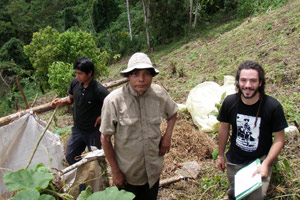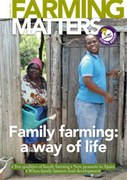Some may view indigenous communities as being conservative and backwards. However, the Kabekwa (Cabécar) in Costa Rica show that such communities can be adaptable and innovative. This indigenous community has been evolving constantly in response to changing circumstances, while maintaining much of their identity. The Kabekwa have developed agro-ecological farming systems that go far beyond the provision of food: systems that allow family members to develop and enjoy their intelligence, physical strength and social skills, whilst awaking their curiosity and creativity. Their independence from external inputs makes the families more resilient and autonomous, while being able to determine how and what to farm adds meaning to their work and life.
Over the centuries, the Kabekwa have developed a farming system based on local knowledge and resources. They have continued and improved their farming practices for centuries, based on what we now call agro-ecological principles. While innovations are ongoing, this continues to be the basis of their farming system, even though the use of chemical fertilizers and pesticides has become widespread in the world around them. Their living conditions make external inputs an illogical choice: more than 40% of Kabekwa families are in remote areas with difficult access for vehicles and remote markets.
Farming with nature
The Kabekwa are the second-largest indigenous ethnic group in Costa Rica, their population is currently estimated to be around 14,000. They mostly live in the Talamanca mountain range, in the heart of the country, and manage more than one million hectares of stunning ever-green and ever-humid vegetation. This area lies immediately adjacent to one of the most important biological zones of all Central America, the Indigenous Reserve of Chirripó.
Rosalinda and Juan García Pérez and their 11 children live on this reserve, three hours from Grano de Oro, the main village and closest road access. They use and manage a fenceless 80 hectare parcel that they inherited from their ancestors. Farming is their main activity. Juan and Rosalinda cultivate coffee, bananas, cassava, beans and many other crops. They also take care of chickens, pigs and a horse. The youngest children harvest fruit from the surrounding patches of forest. The eldest son (17 years old) transports the produce daily to the nearest market on a horse, the only available means of transport other than walking. He sells the surplus produce in order to buy the few things that are not produced in the farm, such as rice and oil.
The situation of Juan, Rosalinda and the other Kabekwa is extraordinary, as they have abundant access to natural resources, are highly self sufficient and, as a result, enjoy very good health. Lacking access to chemical inputs, such as fertilizers, they have continually built on their agro-ecological farming practices. One example is maintaining soil fertility using the nitrogen-fixing properties of various trees and bean crops.
Beans are the basis of traditional dishes and they have become the cornerstone of the community’s system of crop rotation. The farmers leave the crop residues on the soil to decompose and be recycled with the residues turning into nutrients that are readily available for new crops. This practice closes a nutrient loop (one of the principles of agro-ecology), and imitates nature: it is very similar to what happens to leaf litter in the surrounding forests. The farming families of the Kabekwa also value and stimulate tree diversity, as attested by the abundance of Poró trees (Erythrina poeppigiana) in the farms. The farmers encourage this nitrogen-fixing tree to grow in their fields, because the leaves and branches provide abundant nitrogen-rich organic matter that feed the crops and the soils.
Meaning and self-fulfilment

Family farmers like the García Pérez family use and develop their creativity and intelligence in finding ways to adapt to new circumstances and explore alternative income sources. For example, they introduced cattle and cash crops, such as cocoa and coffee, which meant altering their traditional agricultural systems. Curiosity, creativity and intelligence led some families to start experimenting with planting coffee in places where the canopy of existing native fruit and timber trees would protect the coffee shrubs.
Learning and teaching play a central role. The Kabekwa culture has a tight social cohesion and all family members play a role. The elders teach the youngest how to maintain the balance in the family and in the farm, how to stay in good health and how to identify what plants will cure a given disease. The inexperienced respect the experienced, but the experienced also value those who will continue their legacy, since young minds are essential for the community to come up with diverse solutions towards attaining food, fibre and medicinal self-sufficiency.
While playing around on the farm and surrounding land, the children of the Kabekwa constantly learn how to recognise edible plants and when and how to harvest each species. A lot of manual labour is needed to maintain the farm and, while helping out, the youth grow strong and develop innovative ways of dealing with challenging situations on the farm.
Classic agronomy often leaves out the human aspect of farming systems or treat it as a marginal dimension. Yet, the Kabekwa demonstrate how agro-ecology can provide multiple dimensions of meaning and self-fulfillment to the work and life of farmers.
Authors
Georges Félix is a member of the Latin American Scientific Society for Agroecology (SOCLA). He is from Puerto Rico and is currently doing a PhD at Wageningen University, The Netherlands. E-mail: georges.felix@wur.nl
Cristian Timmerman, from Chile, is a post-doctoral fellow on Philosophy of Life Sciences at Ben-Gurion University of the Negev, Israel.


